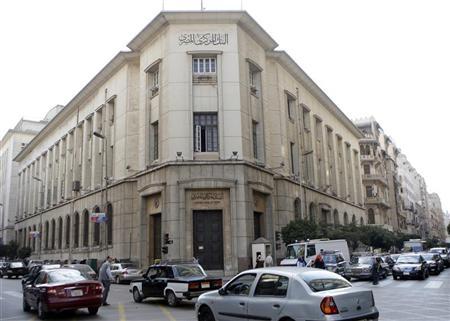Latest NEWS
- Aswat Masriya, the last word
- Roundup of Egypt's press headlines on March 15, 2017
- Roundup of Egypt's press headlines on March 14, 2017
- Former Egyptian President Hosni Mubarak to be released: lawyer
- Roundup of Egypt's press headlines on March 13, 2017
- Egypt's capital set to grow by half a million in 2017
- Egypt's wheat reserves to double with start of harvest -supply min
- Roundup of Egypt's press headlines on March 12, 2017
Egypt sells $600 mln to import basic goods

Central Bank of Egypt -Reuters
By Ulf Laessing and Asma Alsharif
CAIRO, (Reuters) - Egypt's central bank sold $600 million to banks in a special auction of foreign exchange on Sunday to pay for wheat, meat, cooking oil and other essential imports to a country struggling with a currency crisis.
The size of the auction - 15 times the amount the central bank has been selling at its regular currency auctions - showed the extent of pent up demand for dollars as Egypt struggles with an economic crisis two years after the ousting of Hosni Mubarak.
The central bank has been rationing dollars since late December in a system of regular foreign currency auctions brought in to cope with the impact of a run on the pound.
Foreign exchange dealers said the authorities would have to use more dollar reserves to guarantee food supplies. Food price inflation has stoked unrest in the past.
"The effect will be temporary because the demand is a lot higher than this. They must do it again but it is not clear when that will be," said a currency dealer, asking not to be named.
Prime Minister Hisham Kandil said Sunday that the government was looking for ways to stabilize prices of key goods and to ensure the flow of goods into the local market.
He said in comments carried by state news agency MENA that the unspecified measures were needed to stabilize prices in the coming period in the face of possible price hikes.
The hard currency was sold at 6.87 pounds to the dollar - near the official rate. The pound is trading much weaker on the black market where most private sector importers are having to source their hard currency needs.
The special auction follows Qatar's pledge last week to buy $3 billion in government bonds - a boost to foreign currency reserves that had fallen to critically low levels below the $15 billion needed to cover three months worth of imports. At the end of March, the reserves stood at $13.4 billion.
DEPRECIATING POUND
At official rates, the currency has lost a tenth of its value since the beginning of foreign exchange rationing. The central bank has been holding three auctions per week, selling $40 million at each.
Shortages of imported fuel are disrupting transport and leading to power cuts. Egypt, the world's biggest importer of wheat, has also cut back on international purchases this year in the hope of a bumper local harvest.
Sunday's auction was held for banks with clients importing staple commodities such as wheat, cooking oil, tea, meat, fish, beans, butter, corn and baby milk, components for drugs and vaccines as well as spare parts, the central bank said.
The central bank auction coincides with the start of the wheat harvest for which farmers urgently need fuel supplies to run harvesters and transport crops to storage centres.
The central bank did not say when it would hold its next special auction, saying only that future sales would be announced in a statement.
Traders said the central bank was trying to clamp down on the black market, which has flourished this year thanks to the dearth of hard currency.
Recent pledges of foreign aid have strengthened the pound on the black market. The foreign exchange dealer said the pound was now trading at around 7.3 to the dollar, compared to 7.8 before the announcement of aid from Qatar and Libya.
Reports have suggested Libya has agreed to deposit $2 billion with the central bank, though comments from its central bank governor on Saturday indicated the funds did not amount to a fresh injection of hard currency. He said the funds had been deducted from other Libyan investments in Egypt.










